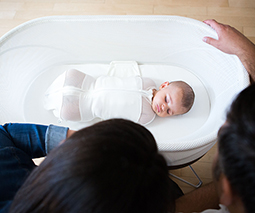Sleep deprived? What to do if your baby has daytime and night time mixed up

When an exhausted mum contacted the Feed Play Love Helpline about her little girl’s night waking, mothercraft nurse Chris Minogue got to the bottom of things immediately.
Lots of changes
“Leah’s daughter is six and a half months old,” Helpline host Shevonne Hunt explained. “When she turned six months, it seemed like everything happened at once. She got her two bottom teeth, started crawling, got her first cold and started waking up every two hours at night for a feed. Kaboom.”
“I think the first three things led into the fourth thing,” Chris suggested.
Previously, Leah’s daughter had been sleeping through the night with the occasional wakeup, but no night feeds. Things have shifted in the last few weeks. She’s moved her daughter onto solids two or three times a day, in addition to her usual breastfeeds.
She “still wakes between 6:00 pm and 6:00 am each night, every two hours and demands breast milk,” Leah says. “I can sometimes fool her with a dummy, but it doesn’t last long. This has been going on for three weeks and I don’t know if it will pass or whether she is now in a habit to eat every two hours. Is there anything I can do or do I have to ride it out?”
Hungry or comfort feeding?
So where to start with addressing this exhausting new night-time pattern?
“I would look at what she needs,” Chris advises, “and then I’d slowly bring her back into the pattern. So we know that she doesn’t need all those feeds at night.”
Chris says the length of time babies feed for during these night feeds also gives us some clues about what’s going on internally.
“Some babies are getting up and they’re just feeding themselves back to sleep so they’d be feeding for somewhere about 1 to 3 minutes and then they just come off and they go to sleep for an hour or two. But other babies who are telling you they’re hungry, they may be feeding for 10 or 15 minutes.”
“I think the take-home message here was she went for a long time without any feeds and then suddenly you started giving her feeds. So she goes ‘okay if that’s the way you want to play it. I’ll play that game’. So I think it just got a bit muddled up.”

Timing is everything
Leah’s baby had been dealing with teething and a cold, but Chris suggests working at reinforcing some more manageable patterns once her bub is feeling better.
“So now we seem to be over most of the things that started like the teething and the illness. I think you just need to relook at it and bring it back together,” Chris said. “I think she’s got her day and her night muddled up and very quickly she’s learnt that when I wake up, I get a feed.”
“Take a few days, write down what you want to do and start to slowly change the pattern around. Take about a week and you should be able to get there.”
There are quite a few factors that contribute to night waking – and a few different approaches may help reset any pesky patterns.
Too much, too fast?
Chris says that despite current research noting that solids often help babies to sleep, you can have too much of a good thing.
“Sometimes this happens when we start solids too fast and give too much, and then the baby takes the solids but they’re too full to drink their milk efficiently in the day. They wake up far more frequently at night and that’s probably the flow on effect of all the things that were happening.”
Babies really need the smallest amounts of solids at this age, and too much solid food can disrupt established feeding patterns dramatically.
“A little 6-month-old probably needs four milk feeds in the day and two good meals maybe one little snack. So if you’re feeding quite a lot of food to her, then this could be why it’s gone a little bit muddled.”
“I would say the easiest way to look at it is about two tablespoons in the morning, two in the afternoon maybe one for lunch. Now if you pull those back what you might do is get her to feed more efficiently in the day and therefore you can then look at your nights and try some resettling.”

Resetting pesky patterns
Taking the time to formalise a baby’s feeding schedule when they’ve gone off the rails like this will pay dividends.
“Give yourself a couple of days to get your day pattern back into place and see what it fixes at night by really feeding her well in the day, in terms of her milk,” Chris suggests.
“If that doesn’t work, then the next thing I would do is the first time she wakes up at night she [only] gets resettled. The second time she wakes, she gets a full feed. The third time she gets resettled again, the fourth time (because she’s waking a lot), I’d give half a feed and I would slowly wean down those feeds at night.”
Brilliant advice from Chris, as usual!
 Need some more baby sleep advice? Our Parent School sleep experts can help. Click to find out more or book a one-on-one session.
Need some more baby sleep advice? Our Parent School sleep experts can help. Click to find out more or book a one-on-one session.









